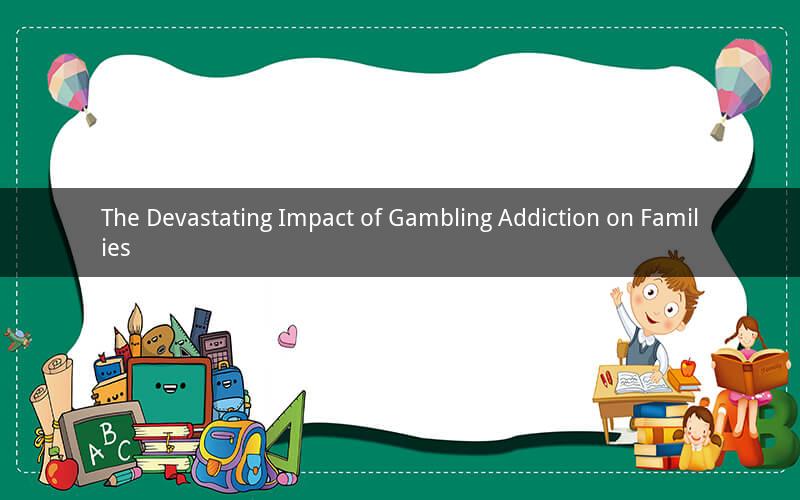
Gambling addiction is a severe issue that affects individuals, but its repercussions extend far beyond the addicted person. Families bear the brunt of this addiction, experiencing emotional, financial, and social distress. This article delves into the ways in which gambling addiction affects families, emphasizing the long-term consequences and offering insights into coping strategies.
1. Emotional Impact on Families
The emotional turmoil caused by gambling addiction is immense. Family members often feel helpless, betrayed, and isolated. Here's how gambling addiction impacts the emotional well-being of families:
a. Betrayal and Trust Issues: Family members may struggle to understand why their loved one would prioritize gambling over them. This leads to a breakdown in trust, as the addicted individual may lie or hide their addiction.
b. Stress and Anxiety: The constant worry about the addicted person's well-being can lead to stress and anxiety for family members. They may worry about their loved one's financial stability, mental health, and even their safety.
c. Depression and Suicidal Thoughts: The emotional burden of gambling addiction can drive family members to depression. In some cases, they may even contemplate suicide as a way to escape the pain.
2. Financial Impact on Families
Gambling addiction can have a significant financial impact on families. Here's how it affects their financial stability:
a. Loss of Income: The addicted individual may neglect their job responsibilities, leading to a loss of income for the family. This can result in financial strain and a struggle to meet basic needs.
b. Debt Accumulation: To support their gambling habit, the addicted person may turn to credit cards, loans, or other forms of debt. This can lead to overwhelming debt that the family must bear.
c. Property Loss: In extreme cases, gambling addiction can lead to the loss of family homes, cars, and other valuable assets.
3. Social Impact on Families
Gambling addiction can also have a profound impact on the social aspects of a family's life:
a. Social Isolation: As the addiction progresses, the addicted individual may withdraw from family and social activities, leading to isolation and a sense of exclusion for family members.
b. Family Tensions: Conflicts and arguments may arise within the family due to the addicted person's behavior. This can strain relationships and create a hostile environment.
c. Divorce and Separation: In some cases, gambling addiction can lead to divorce or separation, as the addicted person's behavior becomes unbearable for their partner.
4. Coping Strategies for Families
Families affected by gambling addiction can take several steps to cope with the situation:
a. Seek Professional Help: Encourage the addicted individual to seek help from a therapist or counselor specializing in gambling addiction. This can provide them with the tools to overcome their addiction.
b. Support Groups: Joining support groups, such as Al-Anon or Gamblers Anonymous, can provide family members with a sense of community and resources for dealing with their struggles.
c. Financial Counseling: Seek the help of a financial counselor to address any accumulated debt and create a plan for financial recovery.
d. Therapy for Family Members: Family members can benefit from therapy to cope with the emotional impact of gambling addiction. This can help them heal and move forward.
e. Setting Boundaries: Establish clear boundaries with the addicted individual to protect yourself and your family from their behavior.
5. Frequently Asked Questions
Q1: How can I tell if my loved one has a gambling addiction?
A1: Look for signs such as secretive behavior, increased financial strain, neglect of responsibilities, and changes in mood or personality.
Q2: Is it my fault that my loved one has a gambling addiction?
A2: No, gambling addiction is a disease that affects the individual, not the family. It's important to avoid blaming yourself or the addicted person.
Q3: Can gambling addiction be cured?
A3: While there is no guaranteed cure for gambling addiction, treatment and support can help individuals manage their addiction and reduce its impact on their lives.
Q4: How can I support my loved one during their recovery?
A4: Offer your love and support, encourage them to seek professional help, and be patient throughout their recovery journey.
Q5: What can I do to protect my family from the impact of gambling addiction?
A5: Educate yourself about gambling addiction, set boundaries, and seek support from professionals and support groups. Remember that you're not alone in this journey.
In conclusion, gambling addiction has a devastating impact on families, affecting their emotional, financial, and social well-being. Understanding the consequences of this addiction and taking steps to cope with it can help families heal and move forward. By seeking professional help, joining support groups, and setting boundaries, families can navigate the challenges of gambling addiction and create a healthier, more stable environment for everyone involved.